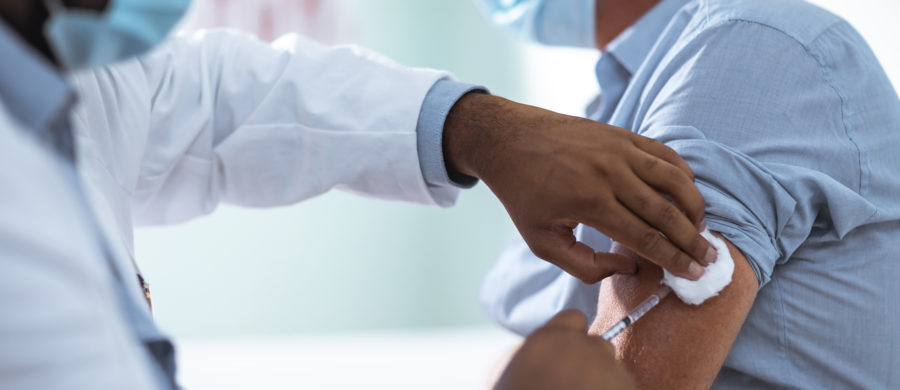Anaphylaxis episodes due to Covid-19 vaccines have been reported outside of clinical trials since mass vaccination campaigns started. According to the Centers for Disease Control (CDC), some people have experienced severe allergic reactions—also known as anaphylaxis—after getting a COVID-19 vaccine. As an example, an allergic reaction is considered severe when a person needs to be treated with epinephrine or EpiPen© or if they must go to the hospital.
While these reports will be investigated further, the CDC considers a history of a severe allergic reaction such as anaphylaxis to any vaccine or any injectable therapy (e.g., intramuscular, intravenous, or subcutaneous) as a precaution, but not a contraindication to receiving the vaccination. In medicine, a contraindication is a condition or factor that serves as a reason to withhold a certain medical treatment due to the harm that it would cause the patient.
If you have reacted to any previous vaccine, a risk assessment should be done by a medical provider to determine the type of reaction you experienced and the risk vs. benefit of receiving the Covid-19 vaccines. A previous mild reaction to a vaccine, such as hives alone without other signs of anaphylaxis, is not a contraindication or precaution to receiving the vaccination.
Individuals who have a history of allergic reactions to any vaccine component should NOT receive the vaccination. You should also not receive the second dose of the vaccine if you have a severe reaction to your initial dose.
Anaphylaxis Symptoms
Anaphylaxis signs and symptoms include:
- Respiratory — The sensation of throat closing, stridor (high-pitched sound while breathing), shortness of breath, wheeze, cough;
- Gastrointestinal — Nausea, vomiting, diarrhea, abdominal pain;
- Cardiovascular — Dizziness, fainting, tachycardia (abnormally fast heart rate), hypotension (abnormally low blood pressure)
- Skin / Mucosal — Generalized hives, itching, or swelling of lips, face, throat
Common adverse reactions that have been reported after vaccination include injection site pain, fatigue, headache, muscle pain, chills, joint pain, fever, injection site swelling or redness, nausea, and swollen lymph nodes. While these side effects may not be pleasant, they tell us that your body is doing exactly what it should when exposed to a new infectious insult, and it’s working really hard to make antibodies to protect you!
Vaccine Ingredients
Here is a chart (from the CDC) that lists the Pfizer and Moderna Vaccine ingredients:
| Description | Pfizer-BioNTech COVID-19 vaccine |
Moderna COVID-19 vaccine |
|---|---|---|
| mRNA | Nucleoside-modified mRNA encoding the viral spike (S) glycoprotein of SARS-CoV-2 | Nucleoside-modified mRNA encoding the viral spike (S) glycoprotein of SARS-CoV-2 |
| Lipids | 2[(polyethylene glycol)-2000]-N,N-ditetradecylacetamide | Polyethylene glycol (PEG) 2000 dimyristoyl glycerol (DMG) |
| 1,2-distearoyl-sn-glycero-3-phosphocholine | 1,2-distearoyl-sn-glycero-3-phosphocholine | |
| Cholesterol | Cholesterol | |
| (4-hydroxybutyl)azanediyl)bis(hexane-6,1-diyl)bis(2-hexyldecanoate) | SM-102 (Proprietary to Moderna) | |
| Salts, Sugars, Buffers | Potassium chloride | Tromethamine |
| Monobasic potassium phosphate | Tromethamine hydrochloride | |
| Sodium chloride | Acetic acid | |
| Dibasic sodium phosphate dihydrate | Sodium acetate | |
| Sucrose | Sucrose |
Additional Notes:
- There is no latex used in the vial toppers for the vaccine;
- The vaccine does not contain preservatives;
- Does not contain any food proteins or environmental allergen components;
- If you have a severe allergy to food, latex, venom, environmental allergens (pollens, molds, animals, etc.), or oral medications, you are NOT at increased risk of severe allergic reaction from the vaccines.
According to the CDC, vaccinations will be given in medical facilities equipped to manage severe allergic reactions. This includes the ability to give medication such as intramuscular epinephrine (such as an Epi-Pen), antihistamines, and other emergency supplies that can help stop an allergic reaction.
Anyone receiving these vaccines should be monitored for 15-30 minutes after receiving the vaccine depending on your risk factors, as discussed with your doctor.
If you’re concerned about having a current COVID-19 infection, start by reviewing our screening questions.
About Katherine McCormack, MD
Asthma, Allergy, and Immunology
 Dr. Katie McCormack treats infants, youth, and adults for everything from seasonal and food allergies to asthma and eczema. She is welcoming new patients to her Louisville, CO clinic.
Dr. Katie McCormack treats infants, youth, and adults for everything from seasonal and food allergies to asthma and eczema. She is welcoming new patients to her Louisville, CO clinic.
Learn More
- Dr. McCormack’s Full Profile
- Please call for an appointment: (303) 440-3083

